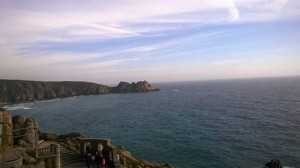Cornwall’s famous Minack Theatre is an impressive achievement. Built against the cliff-side at Porthcurno, this open-air theatre was created almost single-handedly by one woman: Rowena Cade. Her dream was to create the perfect setting for Shakespeare’s The Tempest, although since the 1930s the Minack Theatre has also hosted numerous productions of other works. By building her theatre on the Cornish coast, Rowena Cade aimed to use the cliffs of Porthcurno as the ideal background for Shakespeare’s drama, in which a storm at sea leaves a ship stranded upon the shores of a mysterious island.
Staging The Tempest against a background of real-life wind and waves is an attractive idea, but also draws attention to an important theme in Shakespeare’s play: human control over the elements. During Shakespeare’s lifetime, The Tempest was probably performed in both indoor playhouses and at the Globe, an open-air amphitheatre, but its first recorded performance took place at King James I’s court in 1611. At this indoor court performance, the tempest that frames the play’s narrative could have been represented by a wave machine, as well as the rumbling sound-effects that typically signified a storm on-stage: the playing company would have controlled the introduction and duration of such effects. When Shakespeare explores the theme of human control over the elements within his play, there may be an implied link to these original circumstances of production: Shakespeare, as dramatist, possesses imaginative control over the storm that he introduces into his fictional narrative.
Within the narrative of The Tempest, the idea of human power over the elements is explored through the figure of Prospero. Many years ago, Prospero was exiled to the mysterious island on which the play is set by his treacherous brother, who usurped his former position as Duke of Milan. Yet Prospero has been able to use his magical ‘art’ to acquire control over the spirits of this island; as the play begins, this power enables Prospero to invoke a supernatural storm that maroons a ship carrying his brother on the island. Ultimately, through this device, Prospero is able to bring his brother to repentance, and reclaim his rightful position as Duke of Milan.
The alignment between Prospero’s magical control over the elements, and his ability to reassert his political authority, is striking at a time when Shakespeare’s England was exploring new possibilities for overseas expansion. It was during the sixteenth and seventeenth centuries that the concept of an ‘empire of the seas’ gained significance, as literary critic Claire Jowitt has demonstrated in her book The Culture of Piracy, 1580-1630 (2010). A number of English writers responded to this relationship between marine power and political authority: Sir Walter Ralegh, for instance, argued that ‘whosoever commands the sea, commands…the world itself’ (Discourse of the Invention of Ships, c. 1615).
Shakespeare draws upon this association between command of the seas and imperial domination in The Tempest. His control over the elemental spirit Ariel is one striking example. Ariel is associated with the air and water, and he controls these elements on Prospero’s behalf to create the supernatural storm that carries the ship to harbour ‘in the deep nook where once / Thou call’dst me up at midnight to fetch dew / From the still-vexed Bermundas’ (1.2.227-9). Ariel’s reference to the Atlantic islands echoes the ambitions of those in Shakespeare’s England who hoped to establish a new empire in the Americas. Like Ralegh, a key proponent for such expansion, Prospero aligns such imperialism with command over the seas. Ariel, spirit of the water, is repeatedly characterised as Prospero’s subject: he is described as the latter’s ‘industrious servant’ (4.1.33) or even ‘slave’ (1.2.270), and responds by saluting Prospero as his ‘great master, grave sir’ (1.2.189). Another inhabitant of the island, Caliban, directly attributes Prospero’s colonial power over the island he inhabits to his command over such elemental spirits: ‘I must obey. His art is of such power’ (1.2.371).
Prospero is able to command Ariel, and hence the seas, thanks to the magical arts that he has acquired through his ‘secret studies’ (1.2.77). This association between book-learning and conjuration invites association with the ‘art’ that Shakespeare possesses, as dramatist: the ability to create new worlds of the imagination. In this way The Tempest, a play that reflects on human control over the elements in relation to political ambitions, also highlights the power of the imagination in creating and shaping such dreams of imperial expansion – or of theatrical magic, as in the case of Rowena Cade and the Minack Theatre.



